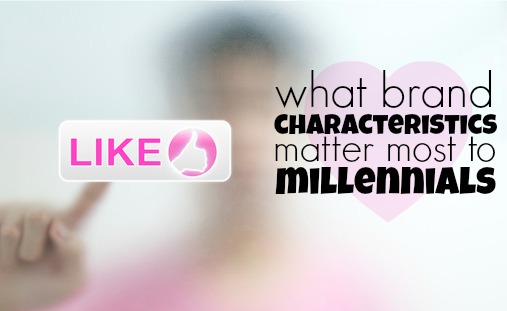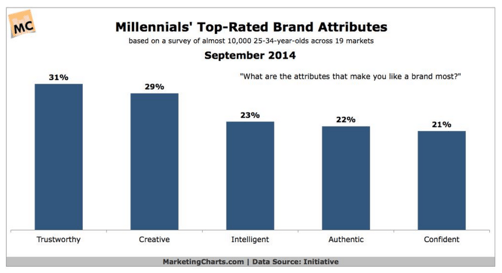Most marketers realize that Millennials are more than just social-savvy, smart-phone toting hipsters – but rather a generation of consumers who are ready to spend money. Millennials – the population born in the US between 1980 and 2000, are now the largest population segment of over 79 million people, and they have purchasing power of over $170 billion per year. This means huge opportunities for those companies who know how to reach this generation of consumers.
Unlike traditional techniques of marketing to the generations before them, Millennials have unique characteristics and marketers must learn to adapt their strategies. They are driven by technology and social media. In fact, 24% of Millennials cite the biggest trait that makes them unusual is their use of technology.
What Millennials' Value In A Brand
MarketingCharts.com recently conducted a survey of Millennials’ top-rated brand attributes. According to the survey, 3 in 10 Millennials are skeptical about the ways brands market to them. “With such skepticism evident, brands should demonstrate their commitment to social causes and emphasize attributes such as authenticity and trustworthiness, per the study, which is based on a survey of almost 10,000 25-34 year-olds in 19 countries.”
Millennials rated the top attributes most likely to make them like a brand as: trustworthiness (31%), creativity (29%), and intelligence (23%). This generation is also drawn to brands that are dedicated to social change. The study revealed that:
- Brands should actively participate to improve causes (59%)
- Brands have the potential to be a force for good (58%)
- They are more loyal to a brand that helps improve societal or ecological issues (54%)
- Only 13% feel that brands should just focus on their products and services.
How Companies Are Responding To Millennial Attitudes
For those brands that are able to pull off these strategies, the payoffs are huge. Chipotle for example is a brand favorite among Millennials. Chipotle uses non-traditional ways to reach this audience with a blend of transparency, creativity, and a focus on social good. Chipotle’s messaging focuses on organic farming, local farm support, and events they have created such as the Chipotle Cultivate Music Festival. As a result, Chipotle’s brand trust has increased 38% in the last 7 years.
Brands like Nike and Old Navy are also Millennial favorites and use tactics such as including consumers in the creation of their marketing, brand experiences, and products themselves. Or brands who embrace difference, such as Dove, in comparison to a brand that portrays negative body images. Almost a decade after the release of Dove’s Campaign for Beauty, studies show that the brand continues to inspire confidence and loyalty among Millennials.
Using Personalization To Reach Millennials
Along these lines, it is essential for a company to understand its audience(s). Groups and subgroups are going to differ in their demographic (i.e. age, income, location) and psychographic (i.e. likes, preferences, interests) characteristics. For instance, whereas most baby boomers may indicate that the quality or value of a product is the leading determinant of their purchasing patterns; Millennials may say that the price of a product is their determining factor to making a purchase decision. Moreover, broad groups such as Millennials or baby boomers should be broken down into more specific sub-groups.
Beyond creating a favorable brand image and understanding one's audiences, marketers must also engage with this generation through personalized and relevant experiences. Collecting and using customer data to create hyper-segmented targeting will swiftly cut through the impersonal messaging cluttering the Millennial filters. Integrating and analyzing multiple sources of data, including social and mobile, allows companies to more accurately predict loyalty and brand advocacy across the shopper journey.
As brands become more successful at creating positive brand images and experiences among Millennials, data-driven strategies will fuel the next wave of interaction with this generation.
Question: What brand characteristics matter to you?
This post was originally posted on DataMentors and has been republished with approval.








